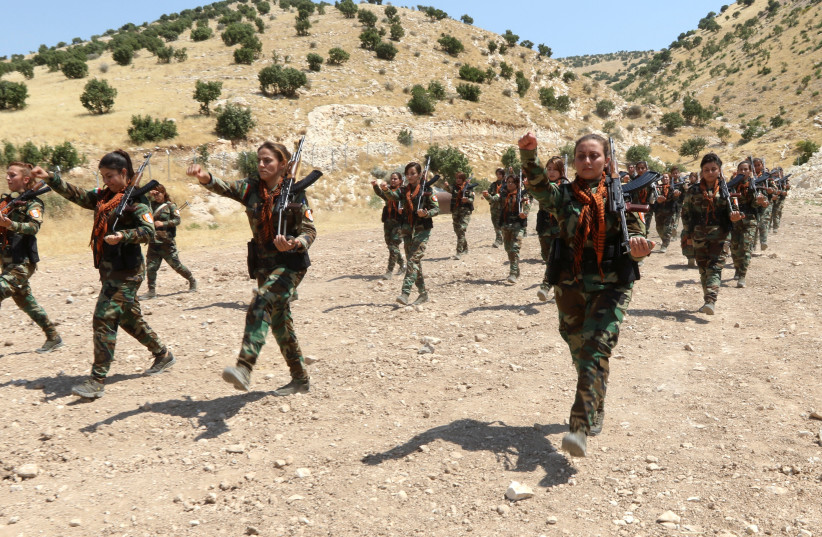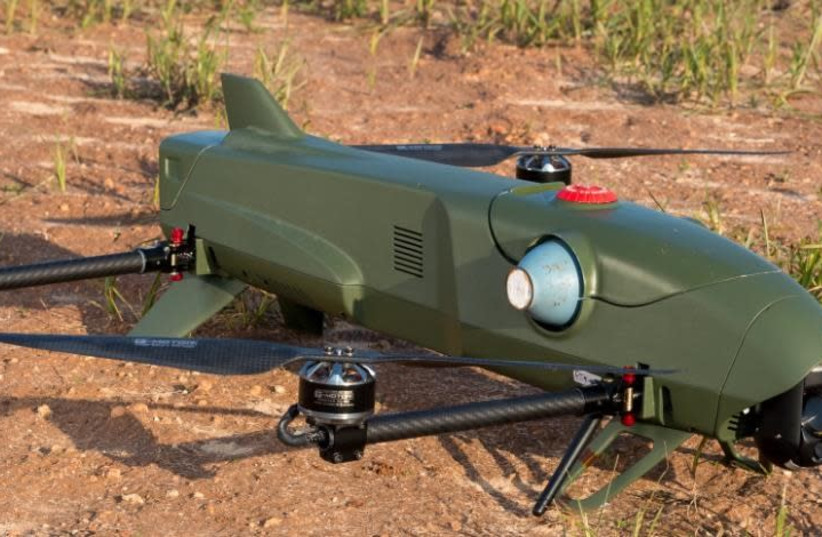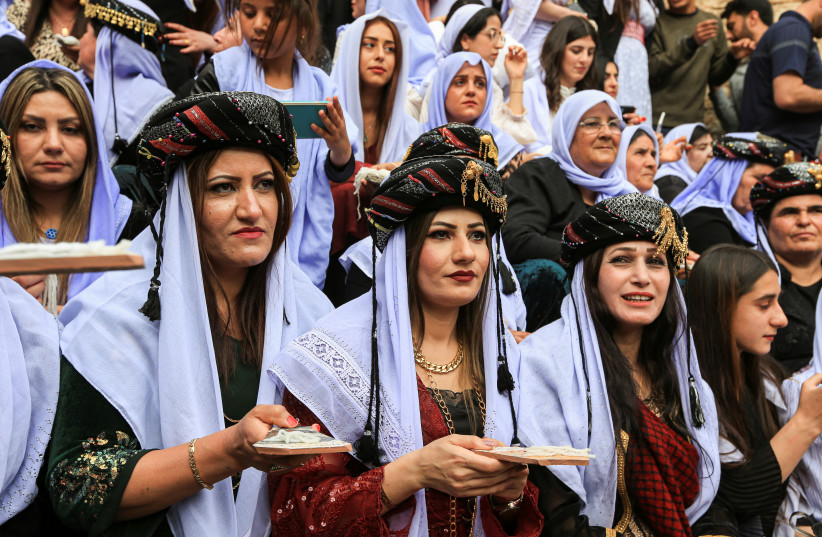A group calling itself Ahrar Sinjar has claimed to carry out a drone attack on a Turkish base in northern Iraq. According to Iranian media, which often reports on events that are linked to Iran and its proxies in the region – or somehow benefit Iran– the attack targeted the Turkish base at Bashiqa east of Mosul and involved “six kamikaze drones.” Other reports said four drones were used and that one struck the base.
The Zilkan base - the crown jewel
This Turkish base is sometimes called the Zilkan base and it is located on the borders of the autonomous Kurdistan region of northern Iraq and areas of Nineveh province that are governed by Iraqi federal forces and include Shi’ite militias and other pro-Iranian groups like the Hashd al-Shaabi Brigade 30 of Shebek minorities.
The Hashd or PMU is a large umbrella group of militias, many of which are Shi’ite and pro-Iran. Since 2018, they have been organized as an official paramilitary force and they maintain checkpoints in some areas of Iraq. Many of these groups are either directly linked to Iran, like Kataib Hezbollah, or are territorial and minority brigades that secure areas where the Iraqi army is weak. In that context, they can easily fire rockets at US forces or Turkey or Erbil from areas such as the Nineveh plains east of Mosul.
The Turkey base that was targeted near Bashiqa previously was used to support Iraqis who had fled Mosul during the ISIS war and later the base was increasingly considered controversial by pro-Iran politicians in Baghdad who view it as Turkish encroachment into Iraq.

Turkey vs. PKK fights play out at military bases
Turkey has a dozen bases and outposts in the mountains of northern Iraq often confined to the border region where Turkey claims to be fighting “PKK terrorists.” However, in recent years, Turkey has launched new operations in this mountainous area and penetrated deeper into northern Iraq, closer to the Kurdish cities of Dohuk and Erbil.
Turkey also uses drones and warplanes to strike at areas in Sinjar and Makhmour. Sinjar is where Yazidis live, people who suffered ISIS genocide. Makhmour is not far from Kirkuk and is an area where there is a refugee camp for Kurds. Turkey accuses the PKK of having bases in these places, but locals say Ankara has targeted civilians and local activists.
The same drones in Iraq, Iran and Gaza
In recent years, the Turkish base at Bashiqa has come under frequent rocket fire. These are similar to rocket attacks that have targeted US forces and facilities in Iraq. Usually, the rockets are 107mm rockets fired from trucks. Pro-Iran militias in Iraq have also increasingly resorted to use drones similar to the kamikaze UAVs used by the Houthis and Hamas in Gaza. These have targeted Erbil, US forces at various facilities and even the Prime Minister’s house.
THE LATEST REPORT from Tasnim news says six drones were used in the attack. The report names Ahrar Sinjar as the group behind the attack. “We have already warned of the consequences of Turkey’s continued invasion of Iraq and its safe-havens,” the media says. Iranian media often reports on incidents like this when they are linked to pro-Iran groups and they get the statement directly from the group. Pro-Iran groups in Iraq often create new fake names for themselves in order to create plausible deniability, so that the new “group” can’t be targeted because it may not exist; it may be a stand-in for an existing group.
“Our operation was carried out in response to the recent aggression on the outskirts of Kirkuk and Dohuk,” the statement by the new Ahrar Sinjar group said. “These drones hit the intended targets with high accuracy, as a result of which the occupiers suffered material and human losses,” the group stressed. Tasnim news said that “some Iraqi sources say two Turkish soldiers and a Turkish army contractor were killed in the drone strike.”
Rudaw media in Erbil noted that “a drone on Saturday night targeted a military base housing Turkish troops in northern Iraq, killing one person, as Turkey’s offensive against the Kurdistan Workers’ Party (PKK) stationed in the Kurdistan Region’s mountains continues.
” This report does not mention six drones and it appears to link the attack to the Turkish conflict with the PKK. “A drone fell on the Turkish base tonight and injured one person who later passed away,” Mohammed Amin, mayor of Zilkan subdistrict, where the base is located, told the media network, Rudaw, on Saturday. According to Rudaw, the man killed in the attack was a chef at the base who is from the Kurdistan region.

What do the people think?
Reports online posted about the attack as well. Some posts said the attack was in response to Turkish “occupation” and operations in northern Iraq. The posts claims that the attacks would continue. Some of those posting about this are supporters of Iran and Kataib Hezbollah in Iraq. One of the posts linked the name of the group to the Yazidi minority in Iraq. Turkish airstrikes have targeted Sinjar where Yazidis live.
Some Yazidis are members of the Sinjar Resistance Units (YBS) which Turkey has attacked in the past. Ankara claims these groups are linked to the PKK. In the last weeks there have been clashes between YBS and the Iraqi army. Thousands have fled and some believe that Turkey had encouraged Iraq to pursue these clashes.
The Iraqi army moved into Sinjar in October 2017 after the Kurdistan referendum, causing Kurdish Peshmerga to leave. However, the YBS which had been fighting ISIS, remained behind. Some sources at the time said the YBS and other Yazidi factions had decided to work with the Iraqi federal forces and also groups linked to the Hashd al-Shaabi.
Turkey pressured Iraq to expel the PKK from Sinjar. Iraq claimed several times between 2018 and 2020 that “armed elements” had left Sinjar. Turkey continued bombing the area, claiming “terror” threats. Turkey has threatened to invade this area.
ALLEGATIONS THAT the Hashd and PKK have coordinated go back several years. In the time after the Iraqi army moved into Sinjar these allegations grew. Turkey has even claimed in December 2020, that PKK members joined the Hashd. The Turkish pro-government Daily Sabah claimed at the time that “Sinjar District Governor Mahma Halil said Wednesday that there is no sign of withdrawal by PKK terrorists from the northern Iraqi district, as envisaged by the US-backed agreement, adding that they are joining the Iran-backed Hashd al-Shaabi (Popular Mobilization Forces - PMF) paramilitary group instead.
“Majority of PKK terrorists joined Hashd al-Shaabi. A group of terrorists might be infiltrated into Tal Afar and Kirkuk as well,” Halil said, Turkish daily Yeni Şafak reported.” This suits that pro-government far-right narrative of Ankara, which wants an excuse to invade Sinjar. Days before the drone attack a statement provided to Turkey’s Anadolu news agency, also claimed that the “Hashd al-Shaabi supports PKK in Sinjar.”
The complexity of Sinjar and the latest attack on the Turkish base could be connected. In late 2021, three PMU brigades, brigades 21, 14 and 33, were sent to Sinjar amid tensions with Turkey. These were a Badr brigade, Kataib Sayyid al Shuhada and a third brigade. Another unit of the Hashd has included Yazidis as part of its Lalish regiment for several years, dating back to 2017.

What does Iranian media say?
What is interesting about the reports of the attack on the Turkish base is the extent to which Iranian media appears to be highlighting and celebrating the attack. IRNA in Iran says Turkey is waiting for more attacks, and other reports pointed to the “quality” of the drones. These reports also indicate the “great accuracy” of the drones. The reports imply also that the Ahrar Sinjar statement did not specify the type or number of drones, meaning Iranian media obtained the number via another method.
The implication is that Iranian media is backing this campaign. While Kurdish media reported about the PKK-Turkey tensions, Iran’s media highlights the fact that Turkey is occupying northern Iraq, a source of anger in Baghdad for some years. Iran’s official news agency, IRNA, says “the presence of the Turkish army deep in Iraq and the establishment of more than 40 bases on Iraqi soil has aroused great sensitivity in various Iraqi groups, especially the Iraqi resistance groups. To this must be added the almost daily attacks of Turkish helicopters, fighters and drones on northern Iraq and, in particular, on Duhok in the Kurdistan Region; where Turkey claims that the forces of the Kurdistan Workers’ Party (PKK) are stationed, this has provided an excuse for Ankara to continue its attacks on northern Iraq.”
ROCKETS HAVE been fired at the Bashiqa base in early April and late April, and in January, as well as numerous times before. In late April, a report also said that Turkey had used a drone to target pro-Iran militias. These increasing rocket attacks and tensions indicate that the base has become a flashpoint.
Turkey is also worried about responding directly to pro-Iran elements. The fact that Sinjar has become the site of new clashes between the Iraqi army and Yazidis seems to make it questionable whether Iran would then work with Yazidi groups in Sinjar or PKK affiliates to attack the Turkish base.
What would be the point of Iraq pushing Yazidi groups out of Sinjar, causing 10,000 people to flee, while Iranian militias allied to the same Iraqi government form ties to Yazidi armed groups and provide the technology for drones to be used against the Bashiqa base? More likely, the same pro-Iran groups involved in targeting the Bashiqa base in the past used the drones they have used against US forces, Erbil and others, to attack the base.
The creation of a new “group” called Ahrar Sinjar may be the excuse for them to strike at Turkey now, alleging to be responding to other Turkish attacks. That Ankara has mobilized its media to blame the PKK is easier for Ankara than blaming Iran.
Iraq thus becomes a proxy battlefield. Another scenario is that in the wake of the clashes between the Iraqi army and Yazidi militia, YBS, the Hashd has sought to divert local frustrations with the clashes by working to encourage attacks on the Turkish base. That pro-Iranian social media has celebrated the attack points to an angle that benefits Iran in some way.
